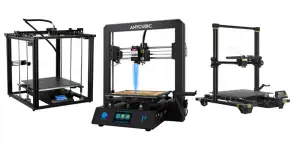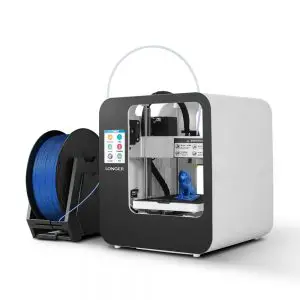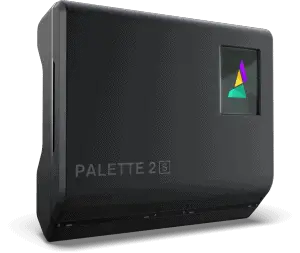As the popularity of 3D printing increases, so do the options of printers available. There’s a distinct difference between printing with filament 3D printing. One machine to consider is the No products found. 3D printer. While this Phrozen Sonic review won’t tackle the differences, feel free to read our article SLA vs. FDM for an in-depth explanation.
Let’s take a look at the specs:
Phrozen Sonic Technical Specifications
| Build Volume: | 120 mm x 68 mm x 170 mm (4.72 in x 2.68 in x 6.69 in) |
| Build Speed: | Maximum speed of 60 mm per hour |
| Leveling: | Assisted |
| Print Layer Height: | 0.05 mm - 0.20 mm |
| Connectivity: | WIFI, USB cable, LAN |
| Software: | Phrozen OS, PZSlice Pro |
| Light Source: | ParaLED 3.0 Module for wavelength 405nm |
| Build Materials: | Phrozen Resins, Non-proprietary SLA, DLP, and LCD resins |
| File Types: | ZIP, SLC, STL |
No products found.
No products found.
Design & Features of the Phrozen Sonic
Forget buying roll after roll of filament, with the No products found., pour the resin into the vat, load your design, and give it some time to print. Printing with photocuring resin is much slower than filament, but the results are finished smoothly with precise detail. This Phrozen 3D printer prints faster than other comparable machines with an impressive speed of 60 mm per hour. A faster-moving linear rail speeds up printing time too.
When it comes to speed, the company markets the printer as being equipped with a mono-LCD masking screen. This screen allows four times the amount of LED light though to cure each layer. ParaLED 3.0 Module technology is specially designed for the mono-LCD screen. This screen is intended to be more transparent than the standard LCD screens used with other resin printers. The increased transparency with a more powerful LED light source speeds up the time needed for layers to cure.
This tailor-made mono-LCD panel for the Photo Sonic is purported to be long-lasting with an advertised 2000-hour lifetime. Of course, advancements in technology don’t come without costs. The Phrozen Sonic’s masking screen is nearly double the price of the standard used across most 3D resin printers. The contrast to paying more for the screen is the wear and tear is diminished and has better thermal stability. It’s supposed to reduce dead pixels too with compression resistance for the less experienced user with some integral tolerances given for operation error.
As users learn to operate the Phrozen Sonic resin 3D printer, they’ll notice the sturdy assembly of the printer. Its injection-molded frame is a sleek design that blends seamlessly into any professional environment. There are multiple cooling fans with a vent on the side of it to help disperse the fumes. The power button is located nearby along with 2 USB ports and a LAN port.
The printer can receive jobs through these ports and via Wi-Fi, leaving users free to continue working tethered or untethered to it. The printer’s settings are accessed through the 5-inch touchscreen display where the bed is leveled with assistance from the Phrozen OS installed on the machine. The Phrozen Sonic 3D printer runs its OS in conjunction with the company’s PZSlice Pro software with preconfigured settings for an easy-to-use printing process.
Printing
The high-resolution touch panel gets you started with its platform assisted leveling features. Phrozen’s Phrozen OS also performs an LCD test to check for defective pixels, which can cause the build to fail. The settings also allow for resin profile selections and adjustments.
The ability to set these adjustments is an essential feature when printing since Phrozen supports all proprietary and non-proprietary LCD, SLA, and DLP resins. Phrozen has an ABS-like gray resin that cures at 1.5 seconds per layer with a layer height of .10 mm. When printing with the company’s wax-like resin, the layer height should be decreased to .05 mm since the curing time takes a bit longer at 1.8 seconds per layer. When switching to non-proprietary resins with different colors and complicated designs, curing times takes longer but still speed by similar 3D resin printers.
The printing speed comes in handy with professional spaces like a dental office where the cure time for items like crowns and mouth casts is about 3 seconds per layer. The curing time is supported by the fast-moving linear Z-axis rail, the mono-LCD masking screen, and the ParaLED 3.0 module light source.
As the build rises out of the vat of resin, there is a multi-fan cooling system helping the curing process. Many 3D resin printer users reinforce the finished build by letting it cure for additional time under an ultraviolet lamp. As a reminder, make sure to add drain holes and supports to the design files where needed. The excess resin needs to drain out of the hollow spaces of the design. Once the build is finished, wipe down any excess residue with alcohol. Try not to over cure the build as it can cause the finished quality to become brittle. PZSlice Pro will help with that. Let’s move on to see what else comes with the printer.
Packing
This plug-and-play 3D resin printer comes ready to right out of the box. There isn’t any assembly needed. Attach the power cord, level the bed, pour in the vat, load your design, and start printing. You will need to purchase resin separately from the printer since no samples are included with the printer.
Here’s what to expect with your package:
- 1 x Phrozen Sonic LCD 3D printer
- 1 x Black power cable
- 1 x Wiper/Scraper
- 1 x Funnel
- A few pairs of gloves. (Always use gloves when working with resin)
Customer Support
The company offers a wide variety of materials on its website, like the Phrozen Sonic manual in both Chinese and English. Users can also find operation instructions for Phrozen OS and the Phrozen PZSlice download for Windows. Technical support can also be reached through the phone and via email.
There is a 1-year warranty included with the purchase of the printer. However, like many resin printers, the LCD screen, FEP release film, and LED array matrix aren’t covered. Modifying the printer in any way will void the warranty.
Phrozen Sonic Pros & Cons
No products found.
No products found.
Pros
- The printer is easy to use and comes ready as a plug-and-play printer
- The mono-LCD is long-lasting with a 2000-hour lifespan
- Third-party resins are supported
- Sleek, sturdy, and professional design
- ChiTu Box and MeshMixer slicers are supported
- Untethered and offline printing is available through USB, Wi-Fi, and ethernet connections
- There’s assisted bed leveling
Cons
- For the price, sample resin isn’t included, so it’s not entirely print-ready out of the box unless you purchase some separately
- The printer is expensive compared to other resin 3D printers
- The build area is minimal at 4.72 in x 2.68 in x 6.69 in
- The mono-LCD costs more than the average LCD masking screen and isn’t covered under the warranty
Verdict
After this No products found. review, the printer just doesn’t seem like it’s worth the price tag. There are other 3D resin printer options with larger build areas and similar features that offer the same quality builds. The only exceptional feature is the increased build speed of 60 mm per hour, but does the faster build time warrant the luxury sales price?
If the budget isn’t an issue, then this Phrozen 3D resin printer is decent enough to give some consideration. It’s sleek and modern design offer a polished, less industrial look. However, if the budget still throws you off, the Phrozen Shuffle resin 3D printer offers a larger build area from the same company but half the print speed. The price is still pretty steep in comparison to the competition, but you can get the same quality as the Sonic.
Last update on 2025-06-05 / Affiliate links / Images from Amazon Product Advertising API




